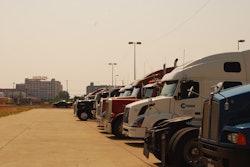The American Trucking Associations will appeal a federal court’s determination that Los Angeles’ port can fully enforce its Clean Truck Program, which ports nationwide hope to use as a model.
On Aug. 26, the court issued a 57-page findings of fact and conclusions of law upholding the port’s requirements, including its concessionaire agreement carriers must sign to work the port. The ATA has condoned the stricter truck standards to meet emissions goals, but had fought other program tenants, especially requiring all drivers be employees.
“The provisions of the concession agreement at issue do not constitute an unreasonable burden on interstate commerce,” wrote Judge Christina Snyder, of the U.S. District Court for the Central District of California, Western Division.
The U.S. Constitution’s Commerce Clause restricts states’ regulation power and the “dormant” Commerce Clause prohibits legislation excessively burdening interstate commerce. It allows a market exemption if the port’s actions are that of a business proprietor, not as a regulator, said Curtis Whalen, executive director of the ATA’s Intermodal Motor Carriers Conference.
The association will also ask Snyder to keep a temporary injunction in place, which has allowed owner-operators to continue to regularly work the port and has barred enforcement of certain other program tenants.

“Inasmuch as all parties agreed at trial that the benefits of the clean truck and clean air elements of the Clean Trucks Plan have been fully realized with the injunction in place, neither the port nor the people of California have been harmed by the preliminary injunction,” the ATA stated.
If the plan is fully enforced, out-of-state and infrequent licensed motor carriers not having a concession agreement would only be permitted up to 24 day passes annually. The charge is $30 and they must have an RFID tag.
The association had argued that among other laws, the Federal Aviation Administration Authorization Act of 1994 bars the port from imposing certain local rules. Congress’ intent was to achieve trucking deregulation and for a state regulation to be preempted under this, it must be “related to the price, route, or service of a motor carrier that transports property.”
The port commissioned a study on the CTP three years ago, known as the Husing report. Snyder noted it estimated the “cost to motor carriers of complying with the off-street parking requirement would average $21,237 per truck” and then quotes the report in that the cost of using employee drivers would “be 167 percent higher than the cost of using today’s (independent owner-operators).”
“In aggregate, the report concluded that drayage services prices would need to increase by 80 percent to cover cost increases, including the cost of higher driver costs, truck purchases, and off-street parking,” Snyder wrote.
Many ports have said they want to use the Los Angeles model. To that end, there was a congressional hearing on the matter in May and a House bill introduced in July to provide an FAAA exemption that would allow ports to use this plan.









